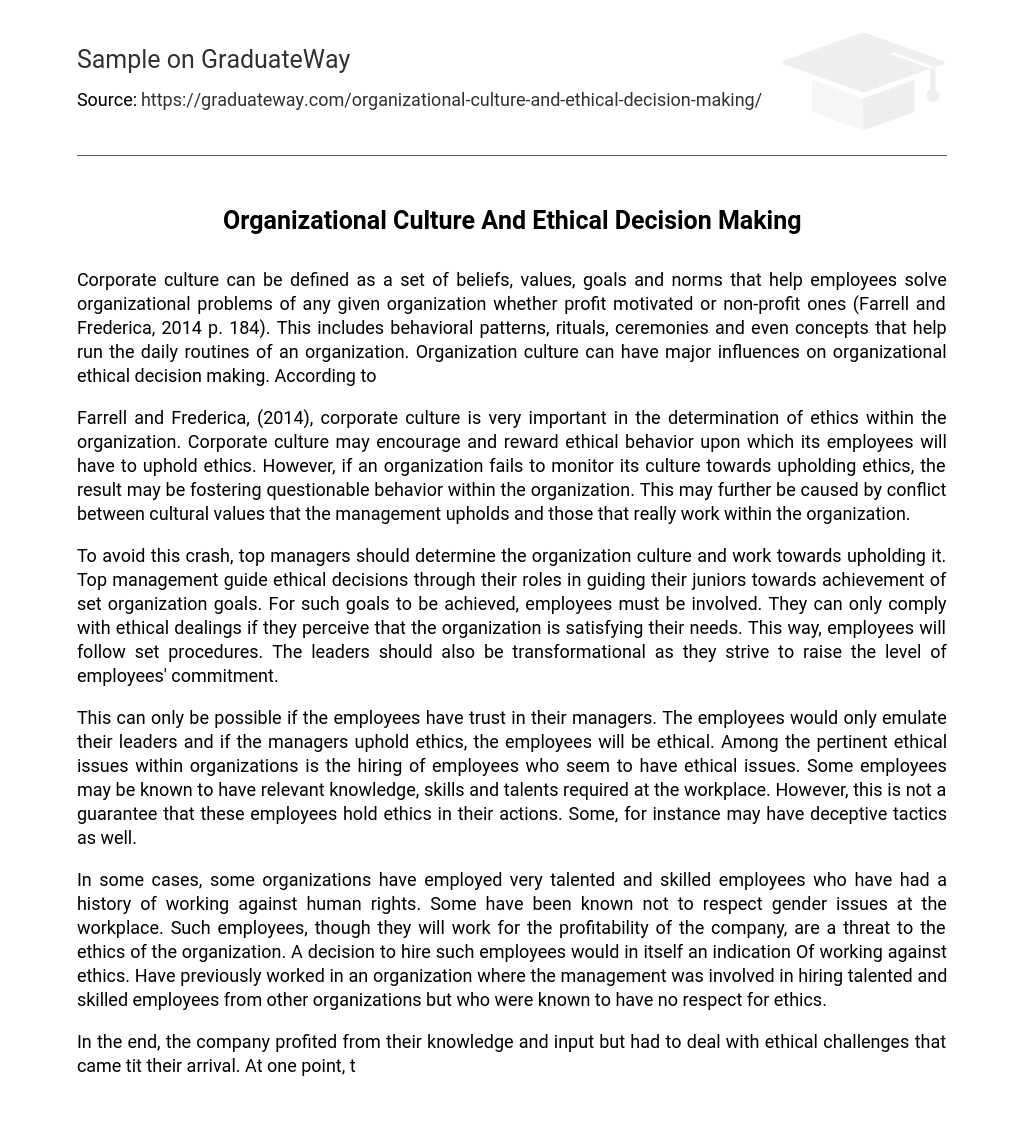Corporate culture can be defined as a set of beliefs, values, goals and norms that help employees solve organizational problems of any given organization whether profit motivated or non-profit ones (Farrell and Frederica, 2014 p. 184). This includes behavioral patterns, rituals, ceremonies and even concepts that help run the daily routines of an organization. Organization culture can have major influences on organizational ethical decision making. According to
Farrell and Frederica, (2014), corporate culture is very important in the determination of ethics within the organization. Corporate culture may encourage and reward ethical behavior upon which its employees will have to uphold ethics. However, if an organization fails to monitor its culture towards upholding ethics, the result may be fostering questionable behavior within the organization. This may further be caused by conflict between cultural values that the management upholds and those that really work within the organization.
To avoid this crash, top managers should determine the organization culture and work towards upholding it. Top management guide ethical decisions through their roles in guiding their juniors towards achievement of set organization goals. For such goals to be achieved, employees must be involved. They can only comply with ethical dealings if they perceive that the organization is satisfying their needs. This way, employees will follow set procedures. The leaders should also be transformational as they strive to raise the level of employees’ commitment.
This can only be possible if the employees have trust in their managers. The employees would only emulate their leaders and if the managers uphold ethics, the employees will be ethical. Among the pertinent ethical issues within organizations is the hiring of employees who seem to have ethical issues. Some employees may be known to have relevant knowledge, skills and talents required at the workplace. However, this is not a guarantee that these employees hold ethics in their actions. Some, for instance may have deceptive tactics as well.
In some cases, some organizations have employed very talented and skilled employees who have had a history of working against human rights. Some have been known not to respect gender issues at the workplace. Such employees, though they will work for the profitability of the company, are a threat to the ethics of the organization. A decision to hire such employees would in itself an indication Of working against ethics. Have previously worked in an organization where the management was involved in hiring talented and skilled employees from other organizations but who were known to have no respect for ethics.
In the end, the company profited from their knowledge and input but had to deal with ethical challenges that came tit their arrival. At one point, the organization was involved in legal cases when an employee sued it (after one of those employees who had been hired for his skills and talents and later promoted to the level of a supervisor) for violation of her rights. She alleged that the supervisor had sexually mistreated her and the organization was forced to pay her thousands of dollars in fines for harassment. Tony Whish is a CEO who has worked towards promoting ethics.
Whish launched an online advertising website which he called Lengthening. As the business grew, his happiness did not grow with it. Instead, he was unhappy at how the employees were not upholding organizational culture. He later sold the company to Microsoft. He formed a shoe-selling company named Capos. Whish made sure in this business, the only MME-losses who were hired were those who were good for company culture. To Whish, ethics is the foundation of success. He insist that ethics dictates happiness for the employees and the customers. According to Farrell and Frederica, (2014 p. 84), Whish believes in being transparent and inning a business based on core values and a meaningful vision that’s not just about money and profits can work for any organization. ” Whish feels that an organization should be aligned around visions and values. For this reason, he advocates for employee rights as well as the satisfaction of customers who are an integral part of any business. Any business which needs to uphold ethics should work towards hiring staff who are ethics sensitive. The hiring of employees should not focus only on skills, knowledge and talent.
Ethics are of paramount importance to the success of any business. There are many profits to be reaped from ethics and much losses to be avoided. Businesses which have less ethics are more likely to be involved in legal tussles over ethics issues. Secondly, top managers should be advised to follow set procedures, values and concepts that embrace ethics as employees learn from them. Ethically sensitive managers are a motivation to the employees to act ethically.





